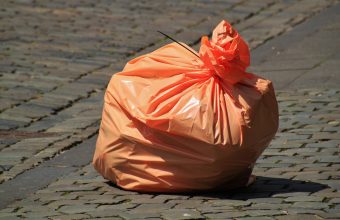Dublin is facing an increasing problem of waste on city streets caused by animals, such as seagulls, tearing open plastic garbage bags.
Areas in the Irish capital where waste collection in bags has been allowed so far include around 1,000 streets. Buildings in these streets were previously exempt from the requirement to use bins and were allowed to dispose of their waste in plastic bags, leaving them outside their premises.
In response, city authorities have decided to implement measures to improve the city’s cleanliness, one of which is the ban on the use of plastic bags in 90 streets of the Central Commercial District.
The ordinance preventing commercial premises from leaving their waste in plastic bags partially came into effect on September 16 of this year, with full compliance expected by January 1, 2025.

“Dublin is not the ‘old dirty city,’ but for too long, commercial premises have been allowed to expose their waste in plastic bags,” said Mayor James Geoghegan, adding that waste collection companies will provide more flexible solutions for restaurants and stores, which will no longer be allowed to place waste bags on the street. This will enable households and businesses in the Central Commercial District to hand over their waste seven days a week from 5 PM to 10 AM the following day.
City authorities also plan to carry out a waste awareness campaign to bring about a cultural and public behavioral change. As part of the broader campaign, they will explore all possibilities for preventing littering. One way to achieve this goal is to reduce the use of plastic bags for waste disposal, and plans are in place to examine the effectiveness of shared waste storage areas in residential complexes, according to the city’s statement.
More:
- Exports in Recyclable Raw Materials Increased in 2023
- New EU Rules to Improve Urban Wastewater Treatment and Reuse
- Up to 11 Million Tons of Plastic at the Bottom of the Ocean
More Employees in City Cleanliness
An additional measure for a cleaner city is hiring another 100 operatives in cleaning and waste collection services.
These reinforcements will increase staff numbers in each of the three teams working in the center, which will allow a total of 150 employees to cover shifts from 6 AM to 9 PM, all seven days of the week. Once the new staff is fully trained and familiar with service requirements, waste collection in the city center will be available 24 hours a day.
In addition to increasing human resources, the city is investing 8.5 million euros in upgrading and improving the fleet for waste management. The new vehicles will include 30 electric side loaders, and the city will also purchase specialized machines for cleaning bike lanes. All these measures represent an important step in improving the cleaning and maintenance services of the city, according to the city administration.

